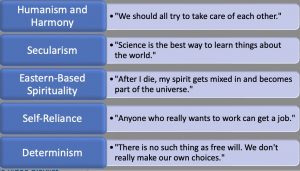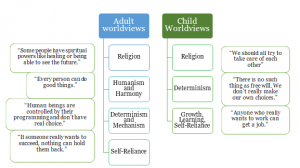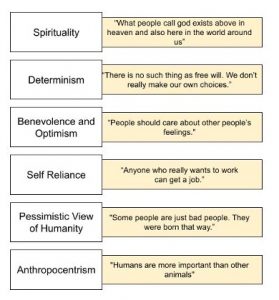Adult Worldview Study (2020)
A worldview is a set of core beliefs about the nature of the universe and humanity, one’s place in the universe and in their social context, and how one should live their life (Kearney, 1984; Nilsson, 2014). Very little is known about the development of worldviews and how worldview beliefs, values, and attitudes are organized into a single worldview. One challenge to conducting such research is the lack of an agreed-upon definition of worldviews and corresponding worldview questionnaire. So, this research sought to develop a comprehensive worldview questionnaire.
To create this new worldview questionnaire, we combined five existing worldview questionnaires (totaling 160 questions) and administered them to undergraduate students. Using factor analyses, we were able to identify the weakest questions and reduced the combined worldview questionnaire to 77 questions. We then administered the 77 questions to a new, larger group of 772 adult participants that we recruited online. This time, we used factor analyses to reduce the questions down to 41. These analyses also revealed that participants’ worldviews consisted of five major components:

This new comprehensive worldview questionnaire, the Unified Worldview Measure (UWM) was then used as the basis for the first child-friendly worldview questionnaire, the Unified Worldview Measure – Child Form (UWM-CF). See below for a summary of that research.
Child Worldview Study (2020)
A person’s worldview is related to their mental health, levels of prejudice, and many other important factors. However, we still don’t know much about how we form our worldviews. In this research, we created the first child-friendly worldview questionnaire and gave it to 83 children ages 7-9 years old and 249 adults, including 44 parents of the participating children. Once the responses of the children and adults were collected and analyzed, we found that there are four main components of adults’ worldviews and three main components of children’s worldviews (see the diagram below).

Here are some of the results from the study:
- Children and their parents were most similar in their religious beliefs and their belief in self-reliance (e.g., “Anyone who really wants to work can get a job.”)
- Christians and their children scored lower on secularism, higher on self-reliance, and higher on determinism (e.g., “People are taught/think that they can make their own choices, but really they can’t.”)
- For our child participants, boys agreed more than girls with the statement “every person can do good things”
- However, for our adult participants, women agreed more than men with the statement “every person can do good things” and other statements under Humanism & Harmony. Men scored higher than women on self-reliance and determinism and mechanism.
In an effort to strengthen the UWM-CF, an updated version of the measure was created by removing weak items and adding new items about worldview beliefs previously not measured in the UWM-CF (e.g., whether people can fundamentally change who they are). The updated UWM-CF was administered to 523 adults ages 19 to 83 to explore the validity of the updated child-friendly measure and relationships among participants’ worldviews and demographic factors. The results of this study were presented at the 2023 NH-INBRE conference. Six main components of adults’ worldviews were found (see the diagram below).

Here are some additional results from the study:
- More conservative/Republican participants scored higher on questions relating to Spirituality and Anthropocentrism, and to a lesser degree, Self-Reliance and Pessimistic View of Humanity.
- Male participants seem to agree more with the scientific, Anthropocentrism, and Self-Reliance questions when compared to females.
- Female participants seem to agree more with Spirituality questions compared to male and nonbinary participants.
- Individuals who identified as religious (e.g., Christian, Jewish, Muslim, etc.) were significantly higher Spirituality and Anthropocentrism questions than non-religious participants.
- Individuals who scored higher on Determinism showed more Anthropocentric beliefs.
The results of this study could indicate demographic trends in individual beliefs and how worldviews may develop. Our future goals are to
- Add new items to Pessimistic View of Humanity and Anthropocentrism,
- Obtain a more diverse sample
- Test the effectiveness of the UWM-CF on kids and teens
The UWM-CF is currently being administered to kids and teens to assess the validity of the measure on this population. if you are interested in helping us with this research, check out the “Participate in Research” page.
Adult Worldview Study (2024)
There is limited data on how worldviews develop. The Unified Worldview Measure–Child Form (UWM-CF) was made to address this gap. Seven hundred and fifty-nine participants across the United States aged 19 to 83 were administered the 33-item UWM-CF as an online survey. The items formed six categories, which were labeled as Spirituality, Self-Reliance, Determinism, Benevolence and Optimism, Pessimistic View of Humanity, and Anthropocentrism. Participants were categorized into four distinct worldview profiles, each with differing scores on the worldview items. Analyses on gender found that women score higher on Spirituality, and men score higher on Anthropocentrism. A correlation on age found that older participants score lower on Determinism and Pessimistic View of Humanity and score higher on Anthropocentrism. Next steps for this research involve testing this measure on children and teens to compare it to the adult sample and adding items to improve internal reliability of several factors.

